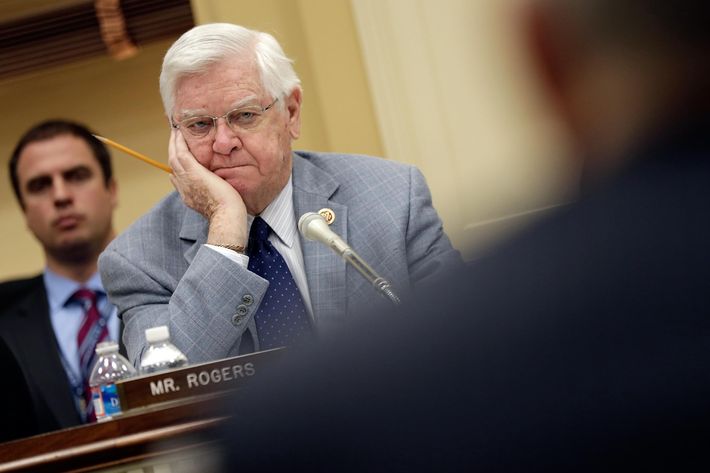
Yesterday, the House of Representatives pulled a bill from the floor for lack of votes — the sort of scrambling chaos that occurs routinely in the chamber where John Boehner presides like a trembling child monarch. But this defeat was different. The bill concerned the funding of housing and transportation programs, though its failure represented more than just a programmatic setback, or even a setback for the Republican economic strategy writ large, but the potential ruin of its entire posture toward Obama. Since taking control of the House two and a half years ago, Republicans have fomented a series of crises that seemed to have no end in sight, explicitly refusing to negotiate with Obama and implicitly denying his legitimacy as president. The crumbling of that wall is far from certain, but yesterday a wide crack opened up.
Yesterday’s unexpected events are the continuing aftershocks of the 2011 political and fiscal standoff. Republicans took control of the House warning of a debt crisis and threatening to precipitate an economic calamity by refusing to lift the debt ceiling. President Obama, mistaking this for an earnest concern about the deficit, tried to lure Republicans to meet him halfway on a plan to reduce spending on retirement programs and close tax deductions, but he discovered, at the last minute, that Republicans couldn’t pass any kind of fiscal compromise. Instead, Obama got Republicans to lift the debt ceiling by creating “sequestration” — automatic budget cuts intended to force the two sides to find a mutually agreeable deficit deal later.
Obama hoped sequestration would force Republicans to deal. The automatic cuts exempted all the major retirement programs, focusing the burden entirely on “discretionary” spending, which means programs that Congress has to authorize every year, as opposed to benefits like Social Security or Medicare that are set by automatic formulas. The cuts would happen in a haphazard way, and, more important, half would fall on defense, theoretically imposing pain on constituencies Republicans want to protect and giving them an incentive to compromise.
But that hasn’t happened. Instead, Republicans, after initially blaming Obama for sequestration (Remember the “obamaquester”? That’s okay — nobody else does, either), quickly shifted into a gleeful embrace of it — spending cuts were good; the more the better. Sequestration appeared to give all the leverage to the GOP. “Democrats have lost on sequestration,” concluded Ezra Klein. Obama offered up a deal in his budget featuring large entitlement cuts in return for modest tax deduction closing, but Republicans rebuffed him.
Democrats in Congress have spent the spring and summer pleading with Republicans to negotiate on the budget, to no avail. The Republican plan has been to lock in sequestration as the new normal. The “negotiation” would be over keeping the government shutdown and lifting the debt ceiling. Republicans would use those events as threats to extract even more concessions from Democrats. Compromise was off the table entirely. The debate within the GOP was not over whether to compromise with Obama — all sides agreed that they should not — but how far to take the hostage tactics. The radical wing of the GOP wants to use a shutdown threat to repeal Obamacare. The “moderates” want to nudge the party toward more realistic demands.
The entire Republican strategy hinges upon a willingness to accept sequestration forever. The first cracks appeared in the Senate, where John McCain, Lindsey Graham, and other defense hawks have grasped that the only way to end sequestration is to make a deal, not just a shakedown, and have endorsed Democratic demands for a House-Senate budget negotiation. Senate Republicans have been meeting regularly with Obama trying to outline possible bargains.

The House, though, has so far resisted their pleas. The House Republican plan is to avoid any negotiations or conferencing with the Senate, and craft its own budget shifting all the sequestration cuts from defense to domestic spending.
Yesterday’s events showed that this is going to be hard. Since the House Republican plan imposes all its austerity on a narrow slice of the budget — programs that are neither automatic income support, like Medicare or Social Security, nor defense — the cuts are extremely deep. So deep, it turns out, that many House Republicans themselves can’t tolerate them.
Several things lent special significance to what would otherwise appear to be a tedious procedural snafu. First, the push-back occurred among the mainstream wing of the House GOP, which has until now dutifully obeyed its leadership, giving all the leverage to the party’s radical wing. Second, House Republicans are not just complaining about the defense cuts but also the domestic spending levels — that is, they’re objecting not only to the piece of sequestration that’s supposed to be Obama’s leverage over them, but also to the piece that’s supposed to be their leverage over Obama. Third, and most significant, you have a House Republican openly subverting Boehner’s no-negotiation approach. House Appropriations Committee Chairman Hal Rogers wrote:
I believe that the House has made its choice: sequestration – and its unrealistic and ill-conceived discretionary cuts – must be brought to an end …
The House, Senate and White House must come together as soon as possible on a comprehensive compromise that repeals sequestration, takes the nation off this lurching path from fiscal crisis to fiscal crisis, reduces our deficits and debt, and provides a realistic topline discretionary spending level to fund the government in a responsible – and attainable – way.

This is exactly what Obama has been trying to get since Republicans took the House — regular negotiations, the presumption that the end result will meet somewhere in the middle, rather than endless crises. More than just the budget is at stake here. The procedural goal stands for a larger decision by Republicans whether or not to accept Obama as a legitimate president and operate like a normal opposition party, or to work backward from the premise that he represents an existential threat to the Republic and search for ever more apocalyptic methods to negate his agenda.
What’s not clear — and where I find Brian Beutler and Matthew Yglesias too optimistic — is whether Republicans will actually choose to start acting like a normal opposition party. Yglesias cites the precedent of Tip O’Neill, the Democratic Speaker who allowed conservative Democrats to join with Republicans to pass Ronald Reagan’s agenda. It’s difficult to imagine Boehner allowing any such arrangement. Conservatives have dangled the threat of a coup over Boehner’s head from the outset of his Speakership, and allowing a center-left coalition to control the House would surely end his reign quickly.
The whole power arrangement of the Republican caucus is so brittle that it’s hard to conceive of a smooth way to work around the hardest-line conservative faction without triggering a fierce counteroffensive that would unleash primary threats and national conservative attacks on dissenting Republicans. Striking deals with Obama would almost require a chunk of House Republicans to leave the party altogether and form a splinter party of Sane Republicans with an entirely different fund-raising and political base. It seems more likely that Rogers and fellow grumblers will just be whipped back into line.
Still, Democrats have at least finally managed to pry open cracks in the solid wall of obstruction. There is still no viable legislative path to the kind of normal, give-and-take negotiation that Obama desperately wants to replace the era of crises. But the desire of at least some Republicans to join him is clearly there.






























